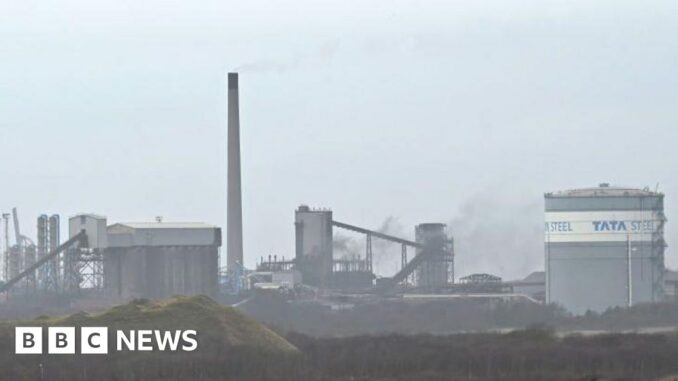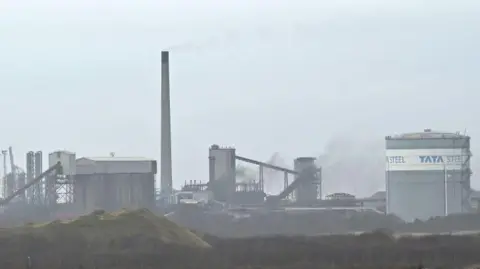
 Getty Images
Getty ImagesThe Unite union has called off a strike planned for 8 July so that further talks can take place over the future of the UK’s largest steel works at Port Talbot in Wales.
Owners Tata had been planning to shut one blast furnace at the site in September and one this Thursday, but then threatened to shut both this week due to safety fears over a staff walkout.
Unite’s strike action was called to the dismay of other unions who feared that it would accelerate the closures and hasten job losses.
The Community and GMB unions had hoped that waiting until blast furnace four closed in September would give them time for more negotiations to extend its life, with a potentially new government in place.
Unite general secretary Sharon Graham said the talks were “essential”.
“Workers were simply not prepared to stand idly by while steel making ended and their communities were laid to waste,” she said, saying the focus should be on fresh investment and the continuation of long-term steel making in the region.
Tata has been in talks with unions since January when it unveiled plans to radically transform its south Wales operations to deal with financial losses and to reduce its carbon emissions.
With government help, the steel giant plans to build a new electric arc furnace that recycles scrap metal and is less energy intensive – a move it says will secure the future of steel making at the site.
However, it would need far fewer staff and require the closure of the two existing furnaces at Port Talbot, resulting in 2,800 job losses.
Extending the life of one of them would save 2,000 of those jobs if the remaining blast furnace was left on until the new electric arc furnace has been built on the site, which could take up to three years.
‘Dangerous game’
Unite, which had pulled out of the talks, was already taking industrial action such as banning overtime and was due to stage an all-out strike from next Monday.
However, last week Tata threatened to close both furnaces within days unless it could “safely and stably operate” them during the strike.
It then wrote to all three unions, offering to begin new talks if the action was called off.
Other unions have welcomed the news but have criticised Unite for giving Tata an excuse to shut the furnaces early.
Sources familiar with the situation accused the union of “playing a very dangerous game of brinkmanship with everyone’s jobs”.
But Unite officials rejected the claims, saying their action “had helped focus minds”.
They are also claiming a victory of sorts over the news that further talks will take place after the election. However, in a letter to unions from Tata – seen by the BBC – it is clear the company had already agreed to further talks after the upcoming election.
‘Nothing but chaos’
Alun Davies, national officer for the Community union, said: “The truth is Tata never walked away from those discussions, and at our last meeting on 22 May all unions agreed to conclude the negotiations and put the outcome to our members.”
Officials from other unions say that Unite has achieved “nothing but chaos and have cost their members money” – a reference to an earlier overtime ban that Unite called without the agreement or knowledge of the other unions.
Union officials acknowledge that there is no guarantee that Tata will agree to extending the life of one furnace beyond its scheduled shutdown in September.
But officials have expressed hope that if Labour wins the election, its manifesto commitment to invest £2.5bn in the steel industry could help secure a lifeline.


Be the first to comment